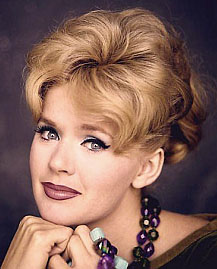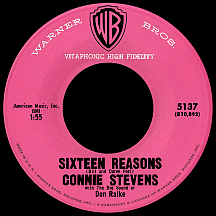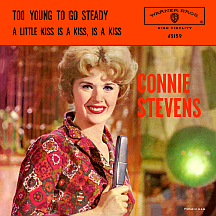CONNIE STEVENS
Sixteen Reasons
During the movie industry's glamour years of the 1930s and '40s, the top studios had a controversial system that kept its actors under contract. Warner Bros., one of the biggest, had dozens of stars locked in: big names like Bette Davis, Barbara Stanwyck and Ida Lupino, the extremely popular "gangster" trio of Edward G. Robinson, James Cagney and Humphrey Bogart and many, many others. The system remained in effect as the studio became more involved in television production during the 1950s, though the focus had shifted to a younger target audience; WB's contract players of that era included Tab Hunter, Troy Donahue and western series stars Clint Walker (Cheyenne), Will Hutchins (Sugarfoot) and James Garner (Maverick). With the introduction of Warner Bros. Records in 1958, the company groomed some of its actors as singers with mixed results (Hunter was already established both ways, while Roger Smith had less luck on record). Others started on the music side: Joanie Sommers, a talented singer, didn't quite click as an actress. The one Warner star who achieved the desired dual purpose was sweet-voiced, cute-faced singer-actress Connie Stevens.
The Brooklyn, New York native, born Concetta Rosalie Ann Ingoglia in 1938, had music in her blood: her mother, Eleanor McGinley, sang with jazz bands, while her father, Pellegrino "Peter" Ingoglia, worked as a jazz drummer under the name Teddy Stevens. Divorce divided the family and Concetta lived with her grandmother for a few years before moving to Los Angeles to be with her father. It was there that she sang with a couple of female groups and began her acting career at age 17 with a small part in Young and Dangerous, a juvenile-delinquents-in-hot-rods B movie released in October 1957. A minor role in Eighteen and Anxious came on its heels as did a more prominent guest shot on Sugarfoot, which premiered on ABC-TV that fall as one of many shows produced for the network by the Warner studio. In 1958 she appeared on an episode of The Bob Cummings Show and did another teen flick, Dragstrip Riot, with actor-singer Tony Butala; the two performed in a vocal group, The Fourmost, a precursor to Butala's successful '60s trio The Lettermen. Funnyman Jerry Lewis spotted Connie and cast her in his big-screen comedy Rock-A-Bye Baby while one other teen-sleaze potboiler, The Party Crashers, played mostly second-run theaters. Meanwhile, she recorded "Between the Devil and the Deep Blue Sea" with singer Ed Davis for L.A.'s Faro label.
Stevens began an exclusive association with WB with two guest shots on 77 Sunset Strip, the detective series that mixed drama with comedy and starred third-wheel wisecracking parking valet "Kookie" (usually upstaging leads Smith and Efrem Zimbalist Jr.), played by New Yorker Edd Byrnes. Connie played Kookie's date on an April installment and joined him in the studio for a hipster novelty song, "Kookie, Kookie (Lend Me Your Comb)" (penned by Irving Taylor, another Brooklynite), which became a major hit that spring and further popularized the slang ('You're the ginchiest!') used by Byrnes on the show.
After this breakthrough, Warner gave 'comb caper' ingenue Connie the star treatment. While she filmed more episodes of western shows (Maverick, Sugarfoot and Cheyenne), it was the series Hawaiian Eye, an island-set take on the detective format (starring Robert Conrad, Anthony Eisley and Maui-born Poncie Ponce) that made her a favorite of the small screen for the next four years. A solo single, "Apollo," appeared just before the premiere of Hawaiian Eye, but failed to harness the momentum of its "Kookie" lead-in. She often performed in the "Shell Bar" (a Hollywood set based on an actual place on Waikiki Beach), doing standards like "Let's Do It (Let's Fall in Love)," "The Man I Love," "Someone to Watch Over Me" and "Embraceable You" and even appeared as her singer-photographer character Cricket Blake on two 1960 episodes of 77 Sunset Strip. Yet the material for her single records were strictly intended for a younger generation (although the selections on her album Conchetta, its title misspelling her given name, featured older songs, albeit different ones than she did on the show).
Husband-and-wife songwriting duo Bill and Doree Post provided the list-style lyrics of "Sixteen Reasons," made even more innocent as delivered by Connie: 'The way you hold my hand, your laughing eyes, the way you understand, your secret sighs...the way you comb your hair, your freckled nose, the way you say you care, your crazy clothes')...and that just gets us to the halfway mark. The late-'59 release gradually took hold over a long period, winter through summer 1960, covering four times the usual number of bases in under two minutes: 'Snuggling in the car, your wish upon a star, whispering on the phone, your kiss when we're alone...the way you thrill my heart...your voice so neat...you say we'll never part...our love's complete!' 15 superficial qualities plus one easy evaluation, set to a catchy melody...and hearts were melting from coast to coast! The Don Ralke production, one of the year's best-selling singles, spent several weeks in the top ten in April and May.

"Too Young to Go Steady," a tender ballad written by Jimmy McHugh and Harold Adamson for the musical stage show Strip For Action, had been a hit for Nat "King" Cole in 1956; Connie's slightly more age-appropriate version had a brief chart run in July '60. Follow-ups "Make-Believe Lover" and "If You Don't, Somebody Else Will" overplayed the cuteness factor, perhaps, but a pair of 1962 discs had solid mid-chart runs: "Why'd You Wanna Make Me Cry," a girl group-style delight, was written by experts in the genre, Gerry Goffin and Carole King. Then "Mr. Songwriter" reached the top 50 during the summer; one of many "deejay request" tunes of the era, it plugged two recent hits ("Bless You" by Tony Orlando and "I Don't Want to Cry" by Chuck Jackson) and gave WB good reason to extend Connie's music contract.
In between seasons of the TV series, she made movies (for Warner, of course) including a pair of Delmar Davies-directed soapers, Parrish and Susan Slade, plus Palm Springs Weekend, a romantic romp (directed by Norman Taurog) with another of her Hawaiian Eye co-stars, Troy Donahue. The series was canceled in 1963 as she continued singing and taking on minor acting roles. She had dated Elvis Presley for several months, then married actor James Stacy (a semi-regular on The Adventures of Ozzie and Harriet), but divorce reared its ugly head within three years. Throughout that time she kept busy with co-star George Burns on the one-season '64 sitcom Wendy and Me and enjoyed a charting single in the spring of '65, the delightful "Now That You've Gone" (composed by Petula Clark and French lyricist Hubert Ballay with English lyrics by Norman Newell, it had been recorded by Clark several months earlier). She appeared onstage in the title role of The Star-Spangled Girl, a comedy by red-hot playwright Neil Simon, which had an eight-month run on Broadway starting in December '66.
Connie's second marriage, to singer Eddie Fisher, lasted about two years from '67 to '69 (with her, he completed some sort of screen-siren-trifecta begun with failed marriages to Debbie Reynolds and Elizabeth Taylor). They had two daughters, future actress-singers Joely Fisher and Tricia Leigh Fisher. Connie's WB contract ran out, but she continued working in movies like 1969's The Littlest Angels and 1971's The Grissom Gang, where she co-starred with previous husband Stacy's other ex-wife, Kim Darby. Connie was on the MGM and Bell labels and her original version of "Keep Growing Strong," a 1970 Thom Bell production with the lyrical hook "Betcha By Golly Wow," was renamed after that hook and became a million seller for The Stylistics in '72.
She later popped up in the films Sgt. Peppers Lonely Hearts Club Band (The Bee Gees' and Peter Frampton's cinematic disservice to The Beatles), Grease 2 from '82 (the best-left-on-the-shelf sequel that former WB idol Tab Hunter also participated in) and the not-so-bad 1987 Frankie and Annette reunion Back to the Beach, with funtime appearances by Dick Dale, Stevie Ray Vaughan, Jan and Dean, Chubby Checker, Pee-wee Herman and her former hair-obsessed valet pal Edd Byrnes. Around that time, the busy Miss Stevens was in the cast of one final TV sitcom, Starting From Scratch, while setting up her own multi-million-dollar cosmetics line, Forever Spring. And there's more. But I've already given you at least 16 reasons to watch and/or listen to Connie Stevens, though her beauty and sparkling personality may be reason enough.



